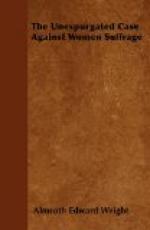Let us note that the suffragist does not—except, perhaps, when she is addressing herself to unfledged girls and to the sexually embittered—really produce much effect by inveighing against the legal grievances of woman under the bastardy laws, the divorce laws, and the law which fixes the legal age of consent. This kind of appeal does not go down with the ordinary man and woman—first, because there are many who think that in spite of occasional hardships the public advantage is, on the whole, very well served by the existing laws; secondly, because any alterations which might be desirable could very easily be made without recourse to woman’s suffrage; and thirdly, because the suffragist consistently acts on the principle of bringing up against man everything that can possibly be brought up against him, and of never allowing anything to appear on the credit side of the ledger.
The arguments which the woman suffragist really places confidence in are those which are provided by undefined general principles, apothegms set out in the form of axioms, formulae which are vehicles for fallacies, ambiguous abstract terms, and “question-begging” epithets. Your ordinary unsophisticated man and woman stand almost helpless against arguments of this kind.
For these bring to bear moral pressure upon human nature. And when the intellect is confused by a word or formula which conveys an ethical appeal, one may very easily find oneself committed to action which one’s unbiased reason would never have approved. The very first requirement in connexion with any word or phrase which conveys a moral exhortation is, therefore, to analyse it and find out its true signification. For all such concepts as justice, rights, freedom, chivalry—and it is with these that we shall be specially concerned—are, when properly defined and understood beacon-lights, but when ill understood and undefined, stumbling-blocks in the path of humanity.
We may appropriately begin by analysing the term “Woman’s Rights” and the correlative formula “Woman has a right to the suffrage.”
Our attention here immediately focuses upon the term right. It is one of the most important of the verbal agents by which the suffragist hopes to bring moral pressure to bear upon man.
Now, the term right denotes in its juridical sense a debt which is owed to us by the State. A right is created when the community binds itself to us, its individual members, to intervene by force to restrain any one from interfering with us, and to protect us in the enjoyment of our faculties, privileges, and property.
The term is capable of being given a wider meaning. While no one could appropriately speak of our having a right to health or anything that man has not the power to bestow, it is arguable that there are, independent of and antecedent to law, elementary rights: a right to freedom; a right to protection against personal violence; a right to the protection of our property; and a right to the impartial administration of regulations which are binding upon all. Such a use of the term right could be justified on the ground that everybody would be willing to make personal sacrifices, and to combine with his fellows for the purpose of securing these essentials—an understanding which would almost amount to legal sanction.




